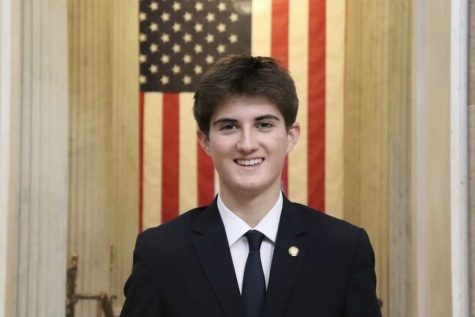How John Fetterman Revolutionized American Politics
Artist’s rendering of Senator John Fetterman, whose populist appeal upended expectations in the 2022 midterms.
During his 2022 run for Senate, John Fetterman campaigned on implementing universal healthcare for all, legalizing marijuana federally, codifying Roe v. Wade, increasing taxes on the top 1%, and eliminating the filibuster. You might think, “Where’d this guy run, Oregon? These positions are so progressive even they might not have elected him!”
Nope. Last November, he was elected by a robust, expectation-shattering, 4.5 percent margin in solid-purple, swing-state Pennsylvania. It’s a constituency which, to put things into perspective, Donald Trump won by over 40,000 votes in 2016 and (thankfully) just barely lost in 2020. Once a Democratic, pro-union bastion of manufacturing and labor, the state has shifted dramatically to the right in recent years. Fetterman’s poll-defying performance yielded Democrats their only flipped Senate seat this cycle, protecting their precarious toehold on Senate control.
So how did he do it? While Fetterman had the advantage of running against an abysmal opponent, millionaire TV snake oil salesman turned Trump sycophant Mehmet Oz, much of his appeal originated from the fact that he was different. Unlike the slick, smooth-talking candidates favored by DC consultants, Fetterman is a real, working-class Pennsylvania guy. He frequents regional PA fast-food spots, vigorously supports his state’s sports teams, and sheds the politician’s uniform of tailored Brioni suits in favor of his ubiquitous Carhartt hoodies and basketball shorts, a style choice which earned GQ’s endorsement during his term as Pennsylvania’s Lieutenant Governor. He’s 6-foot-8, heavily tattooed, and rocks a goatee befitting a middle-school gym teacher, not a distinguished member of our nation’s storied upper chamber.
But that’s kind of the point. As Charlotte Alter for Time Magazine put it, “Fetterman won on vibes.” He’s real, and he made a point of making sure everyone knew his opponent wasn’t. His team churned out memes, many of which he created himself, riffing on Oz’s obvious disconnect from working Pennsylvanians. He relished in pointing out that Oz lives in a lavish New Jersey mansion, only having adopted a Pennsylvania residence two years ago. He gleefully trolled his opponent for his shockingly tone-deaf social media rant over the price of a crudité platter, in which Oz wandered around a PA grocery store, Redner’s (which he mispronounced “Wegner’s”), picking up assorted produce for a vegetable tray. In a cringeworthy dig at Democrats’ handling of inflation, he decried that it costed “$20 for crudité – and that doesn’t even include the tequila!” The message missed its mark, mostly because Oz has a net worth of over $100 million. Obviously, 20 bucks won’t make a dent in his wallet. Fetterman pounced on this gaffe, framing it as a clear example of Oz’s detachment from the average Pennsylvanian. The message struck a chord, and his campaign raised $500,000 in 24 hours from the egregious misstep. His team successfully harnessed the power of social media, an all-important factor in our digital age. After his resounding success, there’s no doubt that political operatives from both parties will try to emulate the energy his campaign created.
More substantively, though, Fetterman’s brand of progressive populism presents a viable way for the American Left to win back the white working class. On “Know Your Enemy,” a progressive podcast, the Fetterman campaign’s Director of Communications, Joe Calvello, argued that Fetterman’s devotion to his home state won him the blue-collar appeal that sealed his victory. Unlike stock Democratic campaigns focused on driving turnout in liberal cities, Calvello argued, Fetterman’s “every county, every vote” strategy allowed him to hear firsthand what had persuaded working-class voters to abandon their staunch Democratic roots in favor of Trump’s anti-establishment message. By reaching out to rural, rust-belt areas of Pennsylvania that have turned into MAGA strongholds, Calvello and Fetterman heard “about the struggles: how hard it is for these small towns, and how these forgotten communities were hollowed out… by multinational corporations, by hedge funds,” and they campaigned accordingly.
Throughout his campaign, Fetterman railed against globalization, a traditionally Democratically-supported system of free trade and deregulated global capitalism critics blame for a dramatic rise in wealth inequality and the decline of traditional working-class manufacturing jobs. It’s a message that Bernie Sanders ran on in his 2016 presidential campaign to great success in Rust Belt states, but Fetterman took that theme and made it his own.
Anti-globalization has also been a staple of the Trumpist right, which uses racially charged and anti-immigrant rhetoric to garner blue-collar support. Instead of echoing that dangerously xenophobic message, Fetterman managed to harness working-class disaffection by framing the situation as it really is: a conflict between multinational corporations and entrenched special interests versus the American people.
In that vein, he’s an American standard-bearer for working-class leftist populism, an international movement championed by parties like SYRIZA in Greece, Convergencia Social in Chile, La France Insoumise in France, and Podemos in Spain. Those parties have gained ground and even control of government in their respective nations, but they haven’t achieved wide majorities or delivered on their mandates yet. Fetterman’s brand of blue-collar progressivism might be the key to the movement’s success in the United States and worldwide. The results couldn’t be clearer: stressing specific, transformative policies that speak to the American working class’s real, pressing economic situation yields progressive victories. Instead of propping up an agenda of globalism and elite-serving neoliberalism, Democrats should use this victory to take back their historical mantle as the party of working people.
As he put it in his acceptance speech, his campaign was “about fighting for anyone who ever got knocked down, who got back up,” a message even more touching when considering his inspirational recovery from a mid-campaign stroke. It was a race “for the future of every community across Pennsylvania. For every small town or person that ever felt left behind, for every job that has ever been lost, for every factory that has ever been closed, for every person who works hard but never got ahead.” Democrats (and the global Left) desperately need more unabashed fighters for our abandoned working class like him. It’s time to finally listen to the working communities we’ve left behind for decades. It’s time to reclaim populism from the far right. It’s time to build a broad, lasting coalition that will produce equality for all.




![Leyla Amjad 26: Being Muslim, its just really hard to find people who relate to you when they dont share [your] experiences.](https://recatalyst.org/wp-content/uploads/2024/02/IMG_9831-600x390.jpg)
